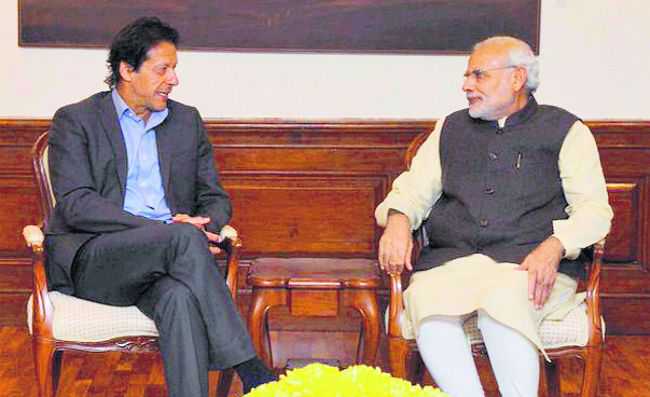
Letdown: Prime Minister Imran Khan has largely failed to walk the talk.
RK Kaushik
Secretary, Government of Punjab
The Pulwama attack and its aftermath have again drawn the attention of the world to the dubious activities and nefarious designs of Pakistan’s Establishment (the Army and the ISI). Prime Minister Imran Khan’s stand reinforces the fact that he is a pusillanimous vassal and an actor of a script written and implemented by the all-pervasive Establishment.
In the 71-year history of Pakistan, there have been only two phases when the Establishment was not in control of defence, foreign and internal security affairs. The first was from August 14, 1947, to October 21, 1951 — the day Prime Minister Liaquat Ali Khan was assassinated; the second began on December 20, 1971, when Zulfiqar Ali Bhutto took charge, and lasted till July 5, 1977, when he was overthrown in a military takeover.
During the rest of its journey, Pakistan has had the conspicuous and humongous presence of the Establishment controlling foreign, defence, internal security and nuclear affairs, not allowing civilian leaders to interfere in these matters.
The reason why democracy became so fragile in the neighbouring country is not hard to find. The structural dynamics of the Muslim League at the time of Independence answer that question. Even in 1937, there was only one member of the Muslim League in the 175-member Punjab Assembly in Lahore. The League had no presence in Balochistan and a meagre representation in the North-West Frontier Province (NWFP).
It was only in 1945 and 1946 that the League started having leaders and workers from the Unionist Party and other groups as its members in Punjab and from the Khaksars and Jamaat-e-Islami in the NWFP. They were self-seeking politicians who, after the death of Liaquat Ali Khan, sided with the Army to share power and perks. The Establishment also brought rich landlords, businessmen etc. into politics to play second fiddle to it in governance.
The Establishment never allowed independent-minded leaders to grow. The moment anybody tried to encroach upon its domain, he was made a horrible example for others. The fate of Zulfiqar Ali Bhutto and Nawaz Sharif (in his third term) proves this fact.
In Pakistan, terrorist organisations such as Jaish-e-Mohammed (JeM), Hizb-ul-Mujahideen (HM), Harkat-ul-Ansar (HuA, presently known as Harkat-ul-Mujahideen), Lashkar-e-Taiba (LeT), Harkat-ul-Jehad-al-Islam (HUJI), Muttahida Jehad Council (MUC), Jammu & Kashmir National Liberation Army and Al-Umar Mujahideen are funded, encouraged, guided, weaponised and controlled by the Establishment. The latter has paramount hatred for India. India remains the big enemy and is discussed and confronted during various war games and strategies.
Pakistan lacks homogeneity due to its critical lack of commonality. Its history, social institutions, languages and ethnicities are not constructive of a common sentimentality as a State. They have always been divergent and divisive. In pursuing a commonality based on religion, one can only bind those that have a consideration for religion in their affairs; this approach becomes parochial in the modern world.
Imran Khan’s growing dependence on the armed forces to provide a panacea for the crisis in the civil administration appears to be sustaining its image of a ‘praetorian’ or ‘garrison’ State despite the military leadership professing outwardly that it has no desire to rule the country. But in reality, it is present everywhere. This trend is evident from increasing military involvement in wide-ranging administrative activities: from managing essential services and monitoring state-owned schools to conducting the census and building non-military roads. Today, the military, under democratic governance, has a wider and deeper participation in civil administration than it had in the past.
When political leaders indulge in undermining each other through unfair means, including the use of state institutions, they lower their image in the eyes of the people and ultimately become a hostage of their own doings. One can give several examples from Pakistan’s history to illustrate how important it is for institutions to reorient their thinking and stay within the constitutional boundaries. This is a major condition for graduating towards a ‘Naya Pakistan’. Mere cosmetic changes and statements, as Imran Khan makes regarding the Establishment that “we are on the same page”, may temporarily make a feel-good impression, but no substantial gain would be achieved.
During his third term as PM — which started in June 2013 — Nawaz Sharif tried to pursue an independent foreign policy, but the Establishment got livid with him. He became a pejorative and loathing topic of discussion in monthly corps commanders’ meetings, leading to his every action getting critically examined there.
That was the time when the Establishment decided to bring in Imran Khan after rejecting the names of then Interior Minister Nisar Ali Khan and then Punjab Chief Minister Shehbaz Sharif. Imran’s victory march was planned and dexterously manipulated, leading to his takeover in August 2018. The powers that be are not going to wither away; seemingly, there is no leader likely to emerge in the near future who can take up the cudgels against them.
So, the world, and especially India, faces the unpleasant reality that the nuclear-armed Pakistan Establishment, which bears animosity towards India, would rule by proxy in the years to come. The recent reports of a likely US withdrawal from Afghanistan is also making it more confident and pompous.
India has no option but to tackle the situation stoically and bravely, and return the compliment as and when possible. We also have to galvanise and improve our intelligence and security apparatus to preempt Pulwama-type incidents.



























